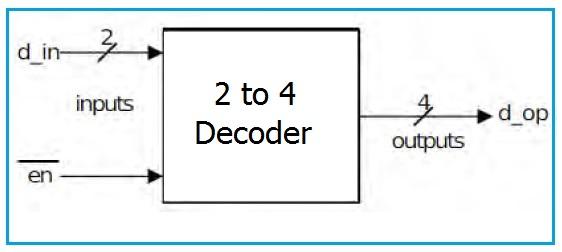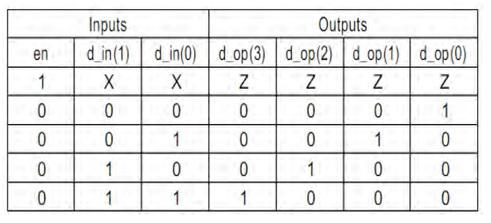VHDL Code for a 2 to 4 Decoder
Advertisement
This page provides the VHDL source code for a 2 to 4 decoder. You’ll also find the block diagram and truth table to help understand how it works.
Block Diagram of 2 to 4 Decoder

Truth Table of 2 to 4 Decoder

2 to 4 Decoder VHDL Code
Here’s the VHDL code implementing the 2 to 4 decoder:
library ieee;
use ieee.std_logic_1164.all;
use ieee.std_logic_arith.all;
use ieee.std_logic_unsigned.all;
entity decoder2_4 is
port (
en : in std_logic;
d_in : in std_logic_vector (1 downto 0);
d_op : out std_logic_vector (3 downto 0)
);
end decoder2_4;
architecture behavioral of decoder2_4 is
begin
process (en, d_in)
begin
if (en = '1') then
d_op <= "ZZZZ"; -- High impedance when enable is active
else
case (d_in) is
when "00" => d_op <= "0001";
when "01" => d_op <= "0010";
when "10" => d_op <= "0100";
when "11" => d_op <= "1000";
when others => null; -- Optional: handles unexpected input combinations
end case;
end if;
end process;
end behavioral;
Explanation:
- Library Declarations: The code starts by including necessary libraries for standard logic operations.
- Entity Declaration: The
entitydeclaration defines the input and output ports of the decoder.en: Enable input (std_logic). When ‘1’, the output is high impedance (“ZZZZ”).d_in: 2-bit input vector (std_logic_vector).d_op: 4-bit output vector (std_logic_vector).
- Architecture Declaration: The
architecturedescribes the behavior of the decoder. - Process: A
processis used to implement the logic. It’s sensitive to changes in theenandd_insignals. - Enable Logic: If the
en(enable) input is ‘1’, the outputd_opis set to “ZZZZ” (high impedance), effectively disabling the decoder. - Case Statement: The
casestatement decodes the 2-bit inputd_inand sets the corresponding output bit ind_opto ‘1’, while the other bits are ‘0’. when others: This is optional, but good practice. It handles any input combination that isn’t explicitly defined, preventing unexpected behavior. In this example,nullmeans no action is taken.
Advertisement
 RF
RF